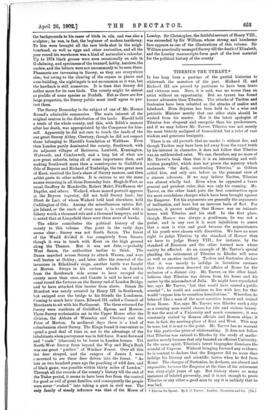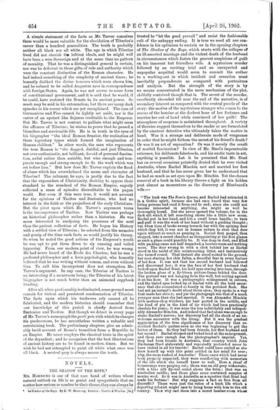TIBERIUS THE TYRANT.* IT has long been a pastime of
the partial historian to whitewash the monsters of the past. Richard II. and Richard HI. are proved by partisans to have been brave and virtuous men. Nero, it is said, was no worse than an artist without an opportunity. But no tyrant has found keener advocates than Tiberius. The attacks of Tacitus and Suetonius have been rebutted as the attacks of malice and falsehood. Even Sejanus has been held to be a wise and patriotic Minister merely that one other stain should be washed from his master. Nor is the latest apologist of Tiberius less eloquent and energetic than his predecessors, and if we may believe Mr. Tarver, Tiberius was not merely the most bitterly maligned of humankind, but a ruler of vast wisdom and generous benignity.
There is an old proverb that no smoke i3 without fire, and though Tacitus may have been led away from the exact truth by his interest in character, it does not follow that Tiberius was an unblemished saint. We can, therefore, say no more of Mr. Tarver's book than that it is an interesting and well. written pamphlet, which does not pierce the mystery which enshrouds "the dark, unrelenting Tiberius," as Gibbon called him, and only sets before us the personal view of a sincere advocate. If we may believe Tacitus, Tiberius was almost wholly bad. Even when he appeared a brave general and prudent ruler, that was only his cunning. Mr. Tarver, on the other hand, puts the best construction upon the most scandalous charges which have been brought against the Emperor. Yet his arguments are generally the arguments of inclination, and have but an insecure basis of fact. For instance, it proves nothing that Horace was on intimate terms with Tiberius and his staff. In the first place, though Horace was always a gentleman, he was not a purist., and in any case it is most injudicious to assert that a man is wise and good because the aequaintances of his youth were chosen with discretion. We have no more right to judge Tiberius by the standard of Horace than we have to judge Henry VIII., for instance, by the standard of Erasmus and the other learned men whose society he affected. As an example of Mr. Tarver's special pleading the retirement of Tiberius to Rhodes will serve as well as another incident. Tacitas and Suetonius declare that it was merely to indulge in licentious excesses that this statesman deserted the affairs of Rome for the seclusion of a distant city. Mr. Tarver, on the other hand. believes that Tiberius was driven from his home and his career by the misconduct of Julia. He might have repudiated her, says Mr. Tarver, "but that would have caused a public scandal "; he could not continue to live with her, for that would "expose him to countless humiliations." Wherefore he behaved like a man of the most sensitive honour and retired from Rome. Nor, says Mr. Tarver, was Rhodes such a city as a cunning man would choose for idle and vicious luxury,. It was the seat of a University and much commerce ; it was constantly visited by Roman officials and Roman ships ; it was, in fact, the meeting-place of East and West. This may be true, but it is not to the point. Mr. Tarver has no warrant for this particular piece of whitewashing. It does not follow that Tiberius was enticed to Rhodes by the study of mathe- matics merely because that city boasted an efficient University. In the same spirit, Tiberius's latest biographer dismisses the scandal of Capreae. Without bringing forward any evidence, he is content to declare that the Emperor did no more than indulge his literary and scientific tastes when be fled from Rome. The charges of Suetonius, he declares, are absurd and impossible, because the Emperor at the time of his retirement was sixty-eight years of age. But history shows us many instances of belated perversity, and it is not enough to prove Tiberius or any other a good man to say it is unlikely that he was bad.
• Tiberius the Tyrant. By J. C. Tarver. London : Constable and Co. [15s.)
A simple statement of the facts as Mr. Tarver conceives them would be more valuable for the elucidation of Tiberius's career than a hundred generalities. The truth is probably neither all black nor all white. The age in which Tiberius lived did not cherish tie loftiest ideals, and be might well have been a wise Sovereign and at the same time no pattern of morality. That he was a distinguished general is certain, nor was he deficient in those gifts of rule and authority which were the constant distinction of the Roman character. He had indeed something of the simplicity of ancient times ; he honestly disliked the divine honours which were shown him, and be refused to be called Augustus save in correspondence with foreign States. Again, he was not averse to some form of constitutional government, and it is said that he would, if he could, have restored the Senate to its ancient power. So much may be said in his extenuation; but there are many dark episodes in his career which are yet unexplained. The case of Germanicus and Piso cannot be lightly set aside, nor is the career of an upstart like Sejanus creditable to the Emperor. But Mr. Tarver is not content to palliate what might seem the offences of Tiberius; he wishes to prove that he passed a blameless and serviceable life. He is in truth in the eyes of his biographer "the ideal Roman Senator, the realisation of those legendary types which formed the imagination of Roman children." In other words, the man who represents the true Roman is "the dogged, dutiful, and just Tiberius, not over-enthusiastic, not brilliant, devoid of personal fascina- tion, awful rather than amiable, but wise enough and tem- perate enough and strong enough to do the work which was set before him." But how does Mr. Tarver explain the flood of abuse which has overwhelmed the name and character of Tiberius? The calumny, he says, is partly due to the fact that the expounders of Christianity, desiring to oppose their standard to the standard of the Roman Empire, eagerly collected a mass of episodes discreditable to the pagan world. But even if this were true, it would not account for the opinions of Tacitus and Suetonius, who had no interest in the faith or the prejudices of the early Christians. But the pivot upon which Mr. Tarver's argument turns is the incompetence of Tacitus. Now Tacitus was perhaps an historical philosopher rather than a historian. He was more interested in analysing the processes of the soul than the patient collection of facts. He began his History with a settled view of Tiberius ; he selected from the memoirs and gossip of the time such facts as would justify his theory. So when he noted the good actions of the Emperor's youth he was apt to put them down to sly cunning and veiled hypocrisy. From our modern point of view, he was wrong. He had never heard of the Ecole des Charles ; but he was a profound philosopher and a keen psychologist, who honestly believed that he was writing without venom, and even without bias. To call him incompetent does not strengthen Mr. Tarver's argument. In any ease, the Tiberius of Tacitus is an interesting if a monstrous being; the Tiberius of his latest biographer is not much better than an animated copybook heading.
After all, when partisanship is eliminated, some ground must remain for violent and persistent condemnation of Tiberius. The facts upon which his traducers rely cannot all be fabricated, and the modern historian should remember that our knowledge of this period is chiefly derived from Suetonius and Tacitus. But though we detect in every page of Mr. Tarver's monograph theparti pris with which he charges his predecessors, he has nevertheless written a valuable and entertaining book. The preliminary chapters give an admir- ably lucid account of Rome's transition from a Republic to an Empire. He never employs the classical texts in the spirit of the dryasdust ; and he recognises that the beat illustrations of ancient history are to be found in modern times. But we wish he had not attempted to paint all white what once was all black. A neutral grey is always nearer the truth.



























































 Previous page
Previous page